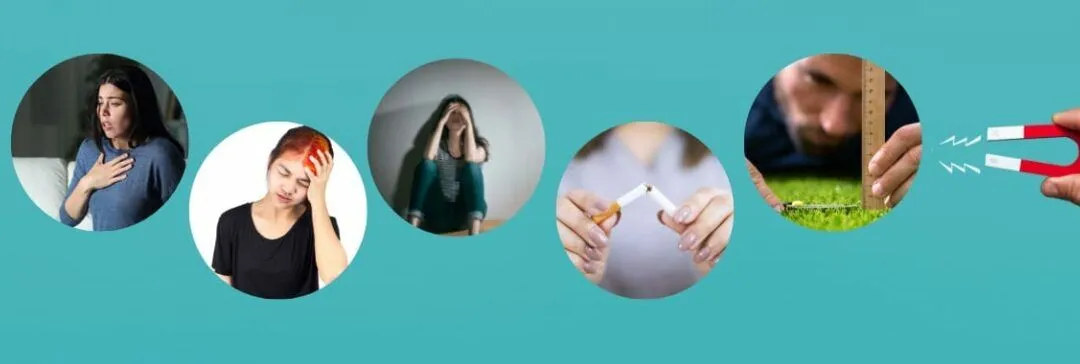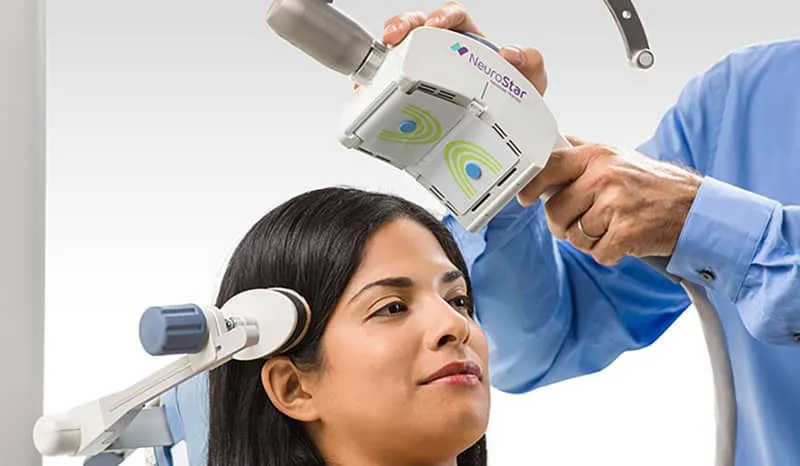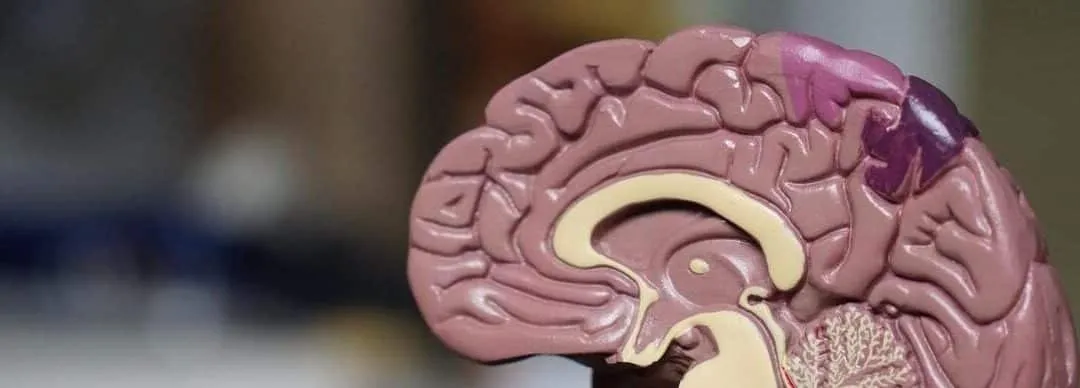What is TMS Therapy Used For? Conditions TMS Can Treat

Transcranial magnetic stimulation (TMS) is a noninvasive procedure that involves the delivery of magnetic pulses to nerve cells in the brain that regulate cognitive functions (e.g., mood, depressive symptoms, anxiety) [1]. This FDA-approved treatment method stimulates the brain through repetitive magnetic pulses and this mechanism of action led to the designation of repetitive TMS or rTMS.
Like most people, you may be wondering “what is TMS therapy used for? The current use of TMS dates back to the 1980s, when it was initially used as a diagnostic tool for neuromotor disorders [2]. Today, TMS treatment spans a wide variety of areas that include psychological disorders, migraines, insomnia, and even smoke addiction [3]. Read on to learn about the different treatment possibilities that TMS therapy offers.
*Disclaimer: This article will explore FDA-cleared treatments and therapeutic approaches that demonstrate preliminary evidence of efficacy.
Can TMS Therapy Treat Depression?
So, what does TMS treat? The FDA approved the use of TMS as a treatment for depression in 2008 – making depression one of the most commonly targeted conditions with TMS therapy [3]. The therapeutic regimen usually involves about seven weeks of daily TMS sessions. According to Dr. Adam Stern, assistant professor of psychiatry at Harvard Medical School, “Approximately 50% to 60% of people with depression who have tried and failed to receive benefit from medications experience a clinically meaningful response with TMS. About one-third of these individuals experience a full remission, meaning that their symptoms go away completely” [4]. According to Dr. Griffith’s in-clinic studies which provide self-reported data from TMS patients who completed treatment, response and remission rates are much higher (80 – 50%).
In addition, research shows that TMS has high efficacy and remission rates in people who are diagnosed with treatment-resistant depression, which is also called medication refractory unipolar major depressive disorder [5],[6]. In such cases, an individual may have tried three or more types of antidepressants without experiencing symptom improvement, or suffered from intolerable side effects – making an alternative approach to treating depression necessary. TMS is often recommended for pregnant women with major depression as well [5]. Unlike antidepressants, the magnetic pulses generated during TMS do not enter the bloodstream, thereby preventing harmful effects on an unborn baby or nursing child.
Can TMS Therapy Treat PTSD?
In addition to helping people better cope with anxiety, TMS shows promise at improving the symptoms of posttraumatic stress disorder (PTSD) [11] [12]. Among trauma-related disorders, TMS treatment for PTSD is one of the most well-studied conditions [11]. Clinical research shows that TMS helps minimize emotional issues related to PTSD such as maladaptive fear processing and associated behavioral changes (e.g., irritability, insomnia, avoidance, anxiety, flashbacks) [11].
One particular study involving over 300 veterans diagnosed with MDD, some of which also struggled with PTSD, demonstrated the benefits of daily TMS treatment for 6-8 weeks. For the veterans with MDD, the response and remission rates were 41% and 20%, respectively [13]. In addition, 65% of the veterans diagnosed with both MDD and PTSD experienced substantial symptom reduction and 46% of this participant group no longer met the threshold criteria for PTSD following TMS treatment [13].
TMS therapy has a good safety profile for people with depression, anxiety, and PTSD alike – with mounting evidence supporting the efficacy of this clinical approach for various mental health issues.
Can TMS Therapy Treat OCD?
TMS was initially approved by the FDA to treat major depression, but through additional experimental treatments, this therapeutic approach emerged as a novel option for people with obsessive compulsive disorder (OCD). TMS therapy is particularly useful for individuals with OCD who have not benefited from medication, cognitive behavioral therapy, or a combination of such interventions [14].
Due to the specificity of magnetic pulse delivery, TMS can be used to target regions of the brain associated with OCD symptoms such as the orbitofrontal cortex on the right frontal lobe [14]. This area is responsible for high order cognitive processes such as adjustment and coping abilities – with deficits in this region being linked to uncontrollably obsessive thoughts.
Fortunately, studies involving the treatment efficacy of TMS for OCD have indicated that about 45% of individuals with this condition who receive daily treatment for at least 4 weeks experience fewer symptoms [15]. Researchers who conducted additional studies reported symptom improvement of 55%, and this clinical evidence led to the FDA-clearance of TMS for OCD treatment [16].
Dr. Griffith of Dr. TMS Therapy Griffith Psychiatry says “our in-clinic TMS therapy shows that this non-invasive approach is great at treating medication-resistant disorders. For our OCD patients who don’t benefit from medication trials, we have a wonderful tool at our fingertips that can bring relief to those uncontrollable thoughts.”
Can TMS Therapy Treat Migraines?
TMS also helps target certain types of neuropathic pain, including migraines. Similar to the targeted region for OCD, the orbitofrontal cortex on the right frontal lobe plays a role in the pain response [17]. For people with migraines and chronic headaches, rTMS in particular, helps alter pain responses and the spreading of pain sensations linked to headache and migraine with an aura [18]. Nerve cell (nerve signal) excitability has been suggested as the underlying cause of persistent headaches and migraine attacks. It is believed that TMS helps lessen the occurrence of this type of neuropathic pain by influencing nerve excitability [17], [18].
Ongoing research supports these indications by showing that individuals suffering from chronic migraine or chronic tension-type headache who receive rTMS for about four weeks experience reduced headache or migraine frequency and intensity [17]. These findings position TMS as a useful alternative, especially for people with neuropathic pain that does not respond to medication.
Can TMS Therapy Treat Bipolar Disorder?
Bipolar disorder is a common condition that is often difficult to treat due to limited therapeutic options. It is characterized by manic, depressive, and mood episodes, although depressive episodes exceed other symptoms in frequency and duration [19]. First-line therapies used to treat bipolar disorder such as antidepressants have limited efficacy and often cause side effects that hinder treatment adherence or lead to additional complications. These issues warrant alternative approaches to treating bipolar disorder.
Research regarding the use of TMS as an add-on therapy for people with treatment resistant bipolar disorder shows that about four to eight weeks of daily TMS treatment helps improve overall symptoms [19]. For individuals who received at least six weeks of TMS, symptoms that disrupted their day-to-day activities decreased without causing unpleasant side effects [19]. Based on these observations, TMS is described as a well-tolerated and possibly effective add-on therapy for people with bipolar depression who are receiving pharmaceutical intervention.
Can TMS Therapy Treat Smoking Addiction?
In addition to targeting psychological conditions, research indicates that TMS helps individuals with smoking addiction [20]. One particular study, which indicated that six weeks of TMS significantly decreased cigarette use, reduced cravings, and doubled the cessation rate, led to the FDA clearance of TMS therapy for smoking cessation [21].
The study involved participants diagnosed with tobacco-use disorder who smoked a minimum of 10 cigarettes daily for about one year. Although the participants desired to quit, they were unable to abstain from smoking for more than three months. Treatment with TMS led to significant cessation rates, with follow-up visits showing that a large percentage of the participants (63%) who quit by six weeks of TMS treatment remained non-smokers at week 18 [21].
It is believed that TMS helps reduce cigarette cravings by targeting regions of the brain (e.g., DLPFC, insula) that are associated with craving behavior [21]. This mechanism of action suggests that TMS may also be effective at targeting other types of additions.
Can TMS Therapy Treat Insomnia?
Insomnia is a common problem that is associated with various health issues such as chronic pain, psychological disorders (e.g., PTSD, depression, anxiety), and addiction [1],[10],[22]. Research regarding insomnia treatment with TMS suggests that this therapeutic intervention improves total sleep time, deep sleep time, and sleep quality, particularly when individuals undergo more than one round of treatment [22].
Previous studies have shown that the curative properties of TMS increase as the number of sessions increase [10]. Clinical evidence also shows that TMS therapy significantly improves stage III and REM sleep, but also demonstrates that two consecutive rounds of treatment have more of a lasting effect after three months than one round of treatment [22].
The targeted regions are the right dorsolateral frontal lobe, for which TMS targets depression and anxiety, as well as the parietal occipital lobe, for which TMS lessens nerve excitability [22].
My mind no longer races as night which allows me to finally get some rest. Because I’m getting better sleep, I have more energy the next day to get things done around the house
Ariel S.
No medications were working for my insomnia or depression. I was so exhausted and could barely get through the day. After TMS, I have more energy, focus and motivation to complete my daily tasks.
Michael R.
However, the simultaneous stimulation of these two regions achieves an anti-anxiety and anti-depressive effect, while also targeting insomnia [22]. In addition, some individuals report that TMS is more effective at enhancing sleep patterns than psychotherapy and medication[22]. This means that TMS therapy should be considered for prolonged insomnia that is poorly controlled with conventional treatment approaches.
Dr. Griffith of Dr. TMS Therapy Griffith Psychiatry says “one common symptom of depression is poor sleep. Our patients are either sleeping too much or not sleeping enough. They may feel extremely tired physically but might also be mentally drained because they are unable to get the rest they need to have a productive, happy day. As we treat depression, some of our patients notice changes in their sleep behavior. They finally get a full night’s sleep (~8 hours) as the symptoms of depression wane.”
What is TMS Therapy Proven to Treat?
Over the years, TMS treatment in the United States (US) as well as Europe has demonstrated the exceptional versatility of this alternative therapeutic approach. In the US, the FDA has cleared the use of TMS devices for MDD, anxious depression (anxiety), OCD, and smoking cessation [20]. Additional psychiatric and neurological conditions with proven clinical evidence of TMS treatment efficacy include [11]:
- PTSD
- Bipolar disorder
- Chronic pain
- Alzheimer’s disease
- Panic disorder
- Phobias
- Migraines
Experimental treatments with TMS for other types of health issues are continuously being conducted in the US [11].
TMS research and treatment has also increased dramatically in Europe where this form of therapy has been cleared by the Conformite Europeenne (CE) to treat [20]:
- MDD
- OCD
- PTSD
- Autism
- Chronic pain
- Schizophrenia
- Bipolar disorder
- Smoking cessation
- Parkinson’s Disease
- Multiple sclerosis (MS)
- Substance use disorder
- Post-stroke rehabilitation
- Alzheimer’s Disease (AD)
In 2014, a group of medical professionals in Europe were also commissioned to establish therapeutic guidelines from clinical evidence regarding the following conditions for which TMS demonstrates efficacy of evidence [10]:
- Epilepsy
- Addiction
- Conversion
- Depression
- Chronic pain
- Multiple sclerosis
- Anxiety disorders
- Movement disorders
- Chronic motor stroke
- Amyotrophic lateral sclerosis
- Tinnitus and auditory hallucinations
TMS is a favorable and versatile approach that is recommended for various conditions due to therapeutic advantages that include [23] [24]:
- Brief sessions that do not require anesthesia
- A well-tolerated technique with minimal side effects
- The absence of physical impairments or memory problems
- Outpatient services that do not interfere with normal, day-to-day activities
- A rare occurrence of seizures
In addition to the good safety and efficacy profile, TMS therapy helps enhance cognitive processes that include memory, focus, and mood control [23] [24] – positioning this intervention as an unrivaled therapeutic approach.
Currently, in both the US and Europe additional steps are being taken to further optimize TMS techniques to demonstrate the relevance of this intervention in routine clinical practice. For the clinical advancement of TMS, medical professionals who offer TMS should also undergo continuous training to ensure high quality standards, guarantee proper patient care, and maximize the probability of positive outcomes. By following these practices, the use of TMS should continue to develop for many years to come.
Need More Information On TMS Therapy?
Have you been asking yourself “what is TMS treatment used for?” If you are ready to learn more about TMS therapy or schedule a consultation to discuss treatment options, contact Dr. TMS Therapy Griffith Psychiatry today.
Our clinic specializes in rTMS technology that:
- Heightens cognitive function
- Enhances mood control
- Targets symptoms of depression
- Minimizes nerve dysfunction
- Revitalizes nerve cells in the brain
If you would like to explore psychotherapy – better known as talk therapy – in addition to rTMS, reach out to our office today! One of our team members would be happy to explain the specialized treatment plans we offer.

Walter G. Griffith Jr., MD, PA
Dr. Griffith earned his Undergraduate Degree from Notre Dame University and his Medical Degree from Ohio State University’s College of Medicine. He then completed his Residency in Psychiatry at Ohio’s prestigious Cleveland Clinic, and ultimately became the Chief Resident at the Cleveland Clinic in his final year of residency. After completing his residency, Dr. Griffith moved with his family to sunny Florida in 1992, where he worked at several hospitals in the early days of his career, but, ultimately, he decided to start his own outpatient Psychiatric Private Practice in Florida, where he has been working and growing the practice over the last three decades. Dr. Griffith is the Medical Director for the medical practice and oversees all of the medical clinicians who work in the practice in order to help manage the growing patient caseload at both of the medical office locations.
Request an Appointment
Our care team would love to hear from you! We want to see our patients get healthy.
This is our top priority.
- 727-577-1203
- Free Consult







